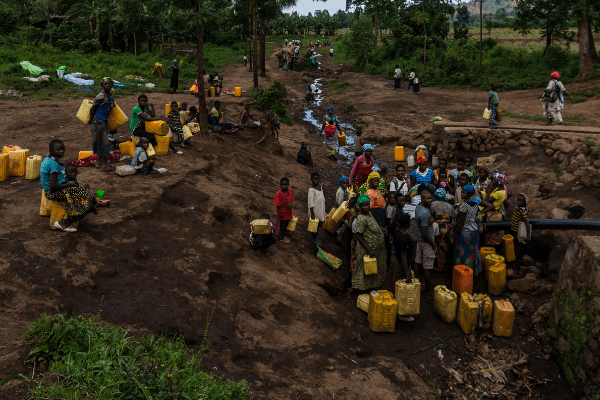An independent inquiry into the Ebola outbreak of 2018 in the Democratic Republic of Congo has revealed that close to 100 women and girls were sexually abused by aid workers during the two years of the outbreak’s response.
The World Health Organization, who commissioned the inquiry, described itself as “heartbroken”.
WHO’s director general, Dr Tedros Adhanom Ghebreyesus said the findings were “harrowing reading” while the regional director for Africa, Matshidiso Moeti said she was “horrified and heartbroken”.
The commission examined 83 cases of female victims aged between 13 to 43 and identified 21 employees of the UN global health body, both local and international staff, who had perpetrated serious abuses, including a number of rapes.
The report revealed that 29 pregnancies resulted from these abuses, with some perpetrators urging their victims to have abortions.
“I’m sorry for what was done to you by people who were employed by WHO to serve and protect you,” Dr Tedros Adhanom Ghebreyesus said.
“I’m sorry for the ongoing suffering that these events must cause.”
“I’m sorry that you have had to relive them in talking to the commission about your experiences. Thank you for your courage in doing so.”
The report was officially released on Tuesday after months of allegations that senior WHO employees had been made aware of multiple abuse claims in 2019 but failed to address them. One of the accused perpetrators had even promoted in the organisation.
On the same day, WHO met with diplomatic officials in Geneva in a closed-door briefing, where it was revealed that four staff members have had their employment contracts terminated and two have been placed on administrative leave.
The report describes the layout of responsibilities required for protecting persons against sexual exploitation and abuse in insecure regions during a health emergency — environments often dominated by male responders.
Most victims of sexual abuse and sexual assault during the Ebola outbreak were said to be “highly vulnerable”, according to the report, with younger women stranded in volatile economic situations and some of the perpetrators even declaring they were preventing sexual exploitation and abuse.
The report also revealed that some workers involved in the Ebola response effort demanded sex in return for employment contracts, as well as threatening women’s livelihoods if they refused.
On Tuesday’s media briefing, when the report was made public, Malick Coulibaly, a panel member of the commission, said there were nine allegations of rape.
One included a horrifying account of “Jolianne”, believed to be the youngest of the alleged victims, who described being taken to a hotel by a WHO driver while she was selling phone cards by the side of the road and raped.
Some female victims have said they hoped those involved in the crimes will be deftly punished.
“I have been waiting for this big moment for more than a month to see how WHO will sanction these [doctors],” one female victim, named Anifa, said.
“We would like to see justice done.”
One member of the Congolese Union of Media Women, Julie Londo, said WHO’s actions have been good, but more is needed.
“WHO must also think about reparation for the women who were traumatised by the rapes, and the dozens of children who were born with unwanted pregnancies as a result of the rapes,” she said.
“There are a dozen girls in Butembo and Beni who had children with doctors during the Ebola epidemic, but today others are sent back by their families because they had children with foreigners. We will continue our fight to end these abuses.”
The report comes after a recent series of sexual abuse and exploitation allegations have shook one of the world’s foremost international organisations.
Last week, journalist May Jeong published a searing expose in New York Magazine of 18 former female UN workers who experienced sexual assault during their time at the organisation.
If you or someone you know needs help, you can call the 1800 Respect National Helpline on 1800 737 732. In an emergency, call 000.


